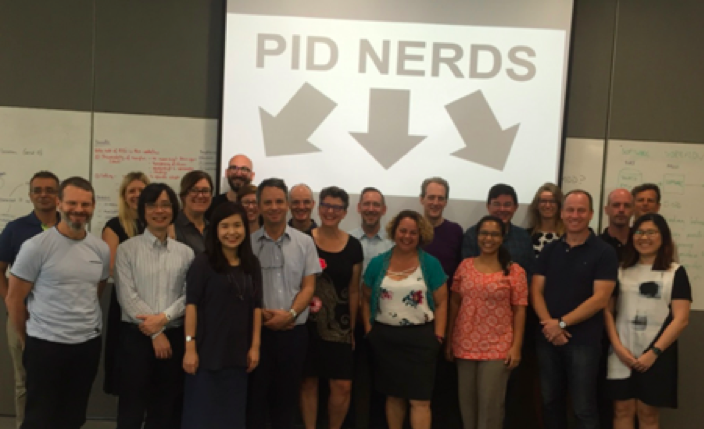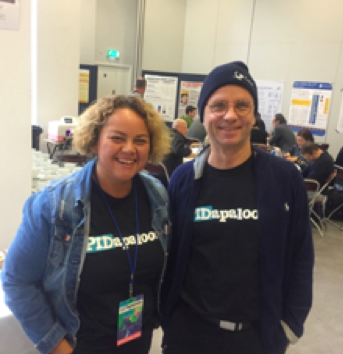Meet the FREYA partners: ARDC
Many different organisations are involved in FREYA and in this blog post series we take a closer look at the partners and their work. This time you can read about ARDC, the Australian Research Data Commons.
What is the mission of your organisation?
The Australian Research Data Commons (ARDC) is a transformational initiative that enables the Australian research community and industry access to nationally significant, leading edge data intensive technical infrastructure, platforms, skills and collections of high-quality data. In partnership with other research organisations, we are leading the way toward a research environment that better enables researchers to find, access, contribute to and effectively use data and services to maximise research quality and impact.
The ARDC is a new organisation formed on 1 July 2018. However, we are a combination of three organisations – ANDS, RDS and Nectar – who bring over ten years’ experience in building research infrastructure and services. Around 40 people work for the ARDC, located at research institutions across Australia. We are funded by the Australian government through the NCRIS program. Our vision is to transform digital infrastructure to support leading edge research and innovation.
Why are PIDs important (for your organisation)?
A research data “commons” has at its foundation some “common” approaches to information and knowledge management. ARDC collaborates with other Australian research agencies to establish underpinning national information infrastructure that improves the identification, discovery, linking and citation of research data, software and related materials. This national infrastructure supports standard definitions, reference values, and identifiers for these common entities; itlinks them to key elements of the research universe such as grants, projects, researchers, and organisations. Shared scientific terminology is a further level of connectedness aspired to in a data commons.
Persistent Identifiers (PIDs) are a core component of this national (and global) infrastructure, enabling research concepts, outputs and objects to be joined up, creating a richer more coherent and connected experience. Without these sophisticated and common approaches to information and knowledge, Australian research will not be part of or benefit from the emerging global research information networks. At national and global scale, cottage industry references to crucial elements of the research enterprise will not suffice. PIDs provide industrial-level standard referencing and identification which are the building blocks of joined-up global research information systems.
The ARDC provides, supports and connects with several persistent identifier services including DOI, IGSN, Handle, ORCID and PURL in addition to being the originator and home of a new PID on the block, the Research Activity Identifier (RAID). As part of the national research infrastructure we facilitate access to such services for Australian research institutions. In addition, we actively promote the use of PIDs to connect research coherently through a program of “PIDagogy”, outreach and community engagement.
What do you do in FREYA?
The vision of FREYA is built on three key ideas: the PID Graph, PID Forum and PID Commons. The PID Graph connects and integrates PID systems to create an information map of relationships across PIDs that provides a basis for new services. The ARDC incorporates the thinking of PID graph into our national discovery service, Research Data Australia. For an example record, see here and scroll down to the connections graph visualisation.
The ARDC contributed to the fundamental design and architecture of the PID Graph. The incorporation of PID graph enables users to find and explore the rich connections between research data, researchers, articles, grants and more.
The PID Forum is a great platform for the PID stakeholder community to share and discuss developments. The ARDC contributes posts to PID Forum and we are also one of the PID Forum administrators, which means we contribute to the collective ownership and shaping of PID forum. This corresponds to an ongoing priority area of ARDC: where PID technology meets community for a holistic approach to persistent identifiers.
The sustainability of the PID infrastructure resulting from FREYA beyond the lifetime of the project itself is the concern of the PID Commons, defining the roles, responsibilities and structures for good self-governance based on consensual decision-making. The ARDC has a strong interest in the sustainability of PID and PID services and we are contributing to this discussion.

Singapore PIDs workshop August 2018. One of a series organised by ARDC, FREYA, ORCID, California Digital Library and Jisc.
In late 2018 and early 2019 we partnered with FREYA and other organisations (Jisc, California Digital Library and ORCID) to run a three-part international workshop series on PIDs for research. The series brought together PID experts to discuss common questions, like, what makes a good PID system? Where do PIDs add value in research workflows? How can we better communicate the value of PIDs? The reports from these workshops were shared on PID Forum. The ARDC actively promotes the goals and progress of the FREYA project to the Australian research community.
What would your perfect (PID) world look like?
In our perfect PID world, identifiers are solving real problems and creating real value for researchers and research organisations (acknowledgement for data and software sharing; real savings in reporting and other information transactions). In this Pidtopia, all stakeholders in the research environment understand the value of PIDs and systematically use them to identify link, cite and track the impact of research. PIDs are built into research infrastructure and research workflows in a seamless and automated way. PID systems are robust, well financed and technically sustainable with open governance structures to ensure community ownership and support transparency. The ARDC continues to offer a range of PID services that benefit the whole Australian research community and it is well appreciated. Oh, and the Australian contingent of PIDs nerds at PIDapaolooza quadruples in size!

Natasha Simons and Adrian Burton at PIDapaolooza January 2019
More information